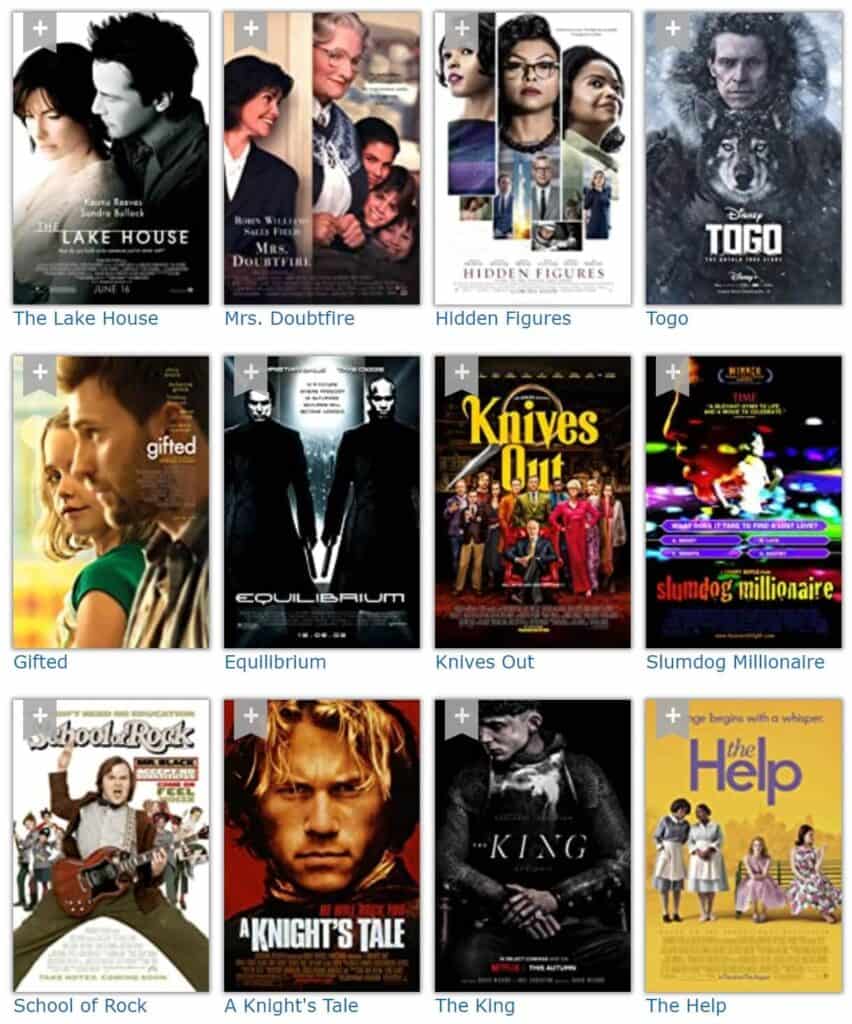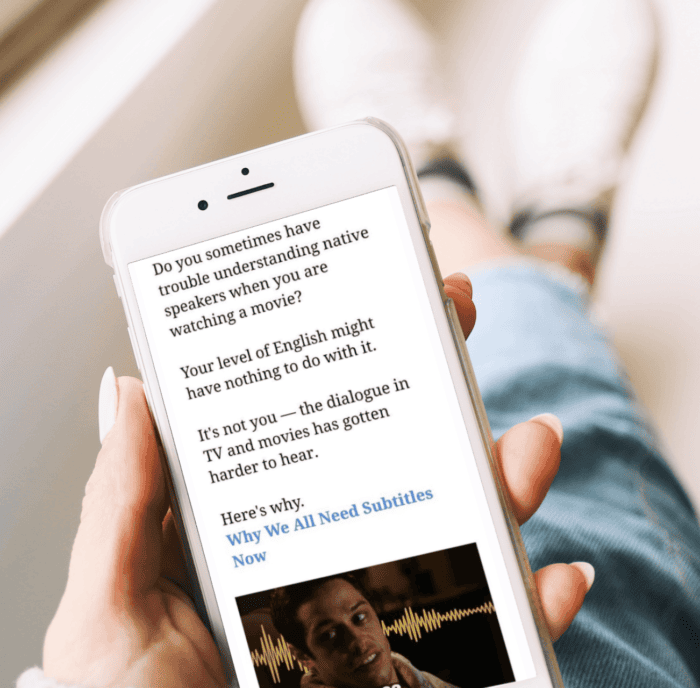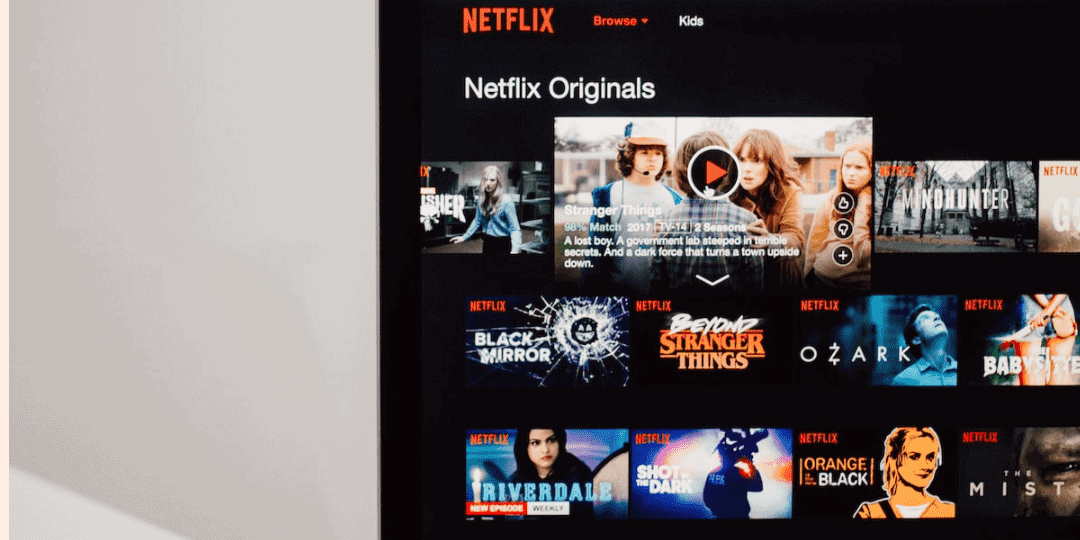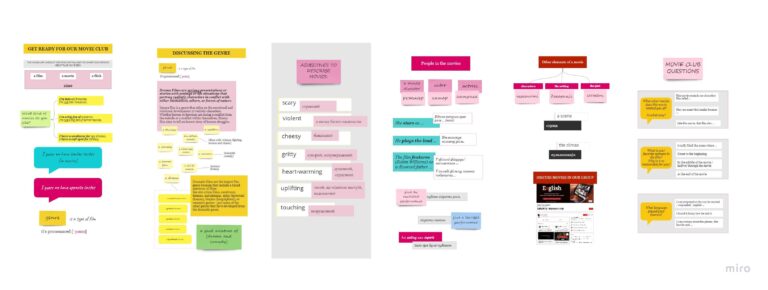In this post you’ll find out why you should bother to learn English with movies and TV shows, and how to do that. So, let’s dive in.
Table of Contents
Benefits of learning English Learning with Movies
Watching movies and TV shows in English was my original goal for learning the language a long time ago. I’ve always been fascinated by great movies, and I’ve always wanted to know how the actors sound “behind” the dubbing (often done terribly in the 80s and 90s).
Nowadays watching movies and TV shows shifted from being a goal to becoming a means: a means of creating an immersive language environment, of emotionally connecting to the language, and – obviously – of hearing and picking up the language, as it is in real life, not in some old dusty sourcebook.
Watching movies and TV shows has become more of a tool than an end goal. Watching them helps create an immersive language environment, emotionally connect to the language, and hear and pick up the language, as it is in real life, not in some yellow-paged taxtbook.
1) Hearing real English is great for listening comprehension and pronunciation. Movies are a powerful tool for learning English. This is because watching movies allows for more immersive language-learning experiences with real-life conversations and scenarios.
2) Lots of input expands your passive vocabulary and grammar. Watching movies and TV shows in English can give you lots of language material to improve your understanding of words and grammar without having to actively study them.
3) You “soak in” native speakers’ culture, customs, and behavioral patterns. You can learn more about the way they talk, their lifestyle, and their etiquette. You can also get to know more about the topics and issues that are important to them, as well as their values and beliefs. With this knowledge, you can better connect to native speakers better.
4) Watching great movies helps you stay motivated. You can become more familiar with the language by watching the characters interact with each other and how they use English in different situations. You can also be inspired to use the English language in creative ways by understanding how different characters express themselves. Watching English-language TV shows can be a great way to stay motivated and make learning English enjoyable.
5) Discussing movies helps you build relationships with other speakers of English. By discussing the themes, characters, and messages of a movie, learners can practice their English conversation skills in an enjoyable way. Through a shared love of films, English learners and speakers can develop a stronger connection with each other.
Proven tips and resources to learn English with movies
I have been watching movies and TV series in English for years, both for fun and to maintain and improve my English. Over the years, I’ve been observing what works and what doesn’t, and here are my tops recommendations. With these resources and techniques, learning English through movies can be a fun, effective, and efficient way to master the language.
Take advantage of English subtitles
I know, some teachers demand you to stay away from subtitles, and I admit, their reasoning is sound. But there are also reasons to use them (I occasionally do).
If you ever feel like you need help in understanding what the characters say in the movie, dont’ hesitate to use the subtitles.
There are many benefits to activating the subtitles, even for native speakers, and they may be especially useful for learners of English like you.
So once you’ve settled in, turn on the subtitles and press play. There is a trick to delay the subtitle for half a second to focus more on catching the words first, and only then check your understanding by looking at the subtitle.
At first, understanding the dialogue may be challenging, but don’t be discouraged. Listening to the actor’s intonations can help you to better understand what they’re saying.
Don’t get hung up on difficult phrases – just keep watching if you are getting the general flow of the conversation. There are other activities you can do after the movie is over – we’ll discuss that later.
Jot down 3-7 unfamiliar words
The key here is not to write them down, but to stop yourself from writing down too many of them. Let’s be honest: you won’t be able to remember them all. So just relax and focus more on the movie. Only write down those words and phrases that prevent you from getting the story, or that make you feel confused.
You can clear up the confusion at once, by pausing the movie and looking up the word – or just ride it out (on context) and look up the words after the movie is over. I presonally prefer option 1, although it doesn’t happen as often as it used to 20 years ago.
Writing down and looking up these words in an English dictionary can become a great educational opportunity. Feel free to use a printed dictionary, if you have one on hand. However, there are also many great online English dictionaries like Longman Learner’s Dictionary, Oxford Learner’s Dictionary, or Cambridge Dictionary – all of which you can access on your laptop, tablet, or smartphone.
Write down those difficult or confusing words or expressions while you’re watching the movie. Subtitles will help you get the spelling right, and movie dialog – the context in which the word was used. You can make a screenshot of the appropriate meaning, or copy it into your language notebook.
If you’re looking up the words after watching the movie, make sure to say out loud the word and the example sentences or the movie line you heard it in. When pronouncing the line or sentence, try to put as much emotion into your speech as you can. Imagine you’re an actor who’s playing this part in the movie. Try to get the part by giving your best performance. This will not only allow you to practice the pronunciation but will also help remember the meaning and the context of the word better.
If you hear this “difficult” word or phrase in another movie, make an effort to add this new context sentence to the one you already have in your notebook.

Avoid Films With Complicated Dialogue
I remember when I tried watching “Snatch” in 2002 or so, when I was already an English teacher at university, and feeling terrified by not being able to understand what some people were saying. I have learned to be OK with not understanding certain dialects, certain people, or certain terminology. From comments on IMDB, I have leared that even native speakers don’t always understand what other native speakers are saying. But not understanding big portions of the movie can be overwhelming and very discouraging.
So when you’re selecting a movie to learn a language from, make sure you’re OK with how much you understand. You can ask someone who has watched theis movie in English (for example, me), or watch a movie clip from that movie and see how much you get. You don’t need to understand everything, but it should not be all gibberish, either.
There are films and TV shows I still find difficult to grasp at first, despite my good level of English and decades of experience watching US and British movies. Among them are movies focused on a field-specific dialogue, like “Billions” (finance), or heavy accents or dialects, like the above-mentioned “Snatch”, “Trainspotting”, etc.
It’s not always easy to predict if a movie is going to be too difficult in this respect, but if you join our movie club, I make sure to select movies that contain relatable dialogue, are easy to follow, and have language that is easy to grasp.
On the other hand, if you have more advanced language skills, look for films that have more complicated words and concepts. That way, you can challenge yourself and try to improve your English level.
Frequently asked questions about learning English with movies and TV shows
Here are some frequently asked questions to help you understand how best to learn English using movies and TV shows.
What kind of movies are best to watch if you want to learn the English language from them?
You can learn English from any type of movie if it’s in English. It’s more important what else you do with the movie apart from watching that will affect your progress in English.
That said, I’d recommend selecting movies with modern-day language, lots of dialogue, clear pronunciation, and revolving around situations you might encounter in your own life. If you have kids, you might be interested in family dramas (“Gifted”) or comedies (“Mrs. Doubtfire”). If you need English for work, you might focus more on workplace dramas like “Jerry Maguire” or “The Pursuit of Happyness” etc. The only rule is that you should enjoy the movie.

Are there any ways I can learn more from movies, besides watching them?
Yes! Watching a movie is entertainment, not learning. To improve your skills, you’ll need to do more than that.
To maximize your results, here are some activities you can do after watching a movie in English:
- write down your impressions and thoughts about the movie in a movie journal
- complete a movie quiz
- learn new words or grammar structures and make your own sentences with them
- discuss the movie with other movie buffs
These activities are all designed to enhance your language learning experience, boost your confidence, and help you improve your English skills.
What kind of language skills can I expect to improve by watching movies and TV shows in English?
While learning a language with movies, you will be able to improve your listening skills and pronunciation. If you use subtitles, you can improve your reading skills and spelling. If you are simply watching, your passive vocabulary and grammar will grow, but you can also do activities to “activate” them and start using in your speech as well.
By writing comments in a movie-related group, movie reviews, or taking notes in your movie journal, you will improve your writing skills. And by participating in movie discussions, you will be able to improve your speaking skills as you focus on expressing your thoughts in English during a group conversation.
What are the best movies to learn English with?
The hard truth is that all movies are meant for native speakers, so all of them are beyond your level of English if you’re still learning it. So take it as a starting point, and don’t let this fact discourage you from trying. Yes, some movies are more difficult than others, but you will definitely encounter unfamiliar words, or won’t be able to understand something a character said.
That’s OK. The more you watch, the easier it will become. You have to start somewhere to be able to make progress. Start with what you like, experiment a bit, or get help from an English teacher or mentor (like me) who can guide you through a movie of your choice.
For beginners, it can be helpful to watch films that contain simpler language and basic concepts. Movies like “UP” and “Toy Story” are great movies for beginners because they contain simple language, easy-to-follow plots, and lots of visuals to help with understanding.
For intermediate and advanced learners, movies that contain more complex language and topics can be beneficial. Films like “The Social Network”, “Inglorious Basterds”, and “The Godfather” can help with developing higher-level English skills. You can find more about the best movies and TV shows to learn English from the post “The Best Netflix Movies & Series to Learn English According to Data Science“.
How can I find English subtitles for my favorite movies?
It depends on how you watch the movie, that is what streaming platform you use, for example, Netflix, Hulu, or Amazon Prime. On these platforms, most movies are available with subtitles. Check the “Subtitles” option when you start to play the movie. Usually, you can click and select the language of the subtitles.
Another way to find English subtitles is to look for third-party subtitling sites, such as opensubtitles.org, subscene.com or addic7ed.com. These sites typically have a large selection of English subtitles for numerous movies and TV series. You can search for and download the subtitles file. Once you have the file, you can open it in a program like VLC Media Player or SMPlayer and turn on the subtitles.
What are some of the challenges of learning English from movies?
Learning English with movies is a great way to improve language skills, expand vocabulary and learn about different cultures. However, it can also prove a considerable challenge. Characters speak very fast, use slang, lots of phrasal verbs and colloquialisms that may be difficult for a non-native speaker to pick up.
If you rely on subtitles to understand a movie, reading them as well as watching might be a problem. Additionally, many subtitles are not translated by humans; some words or phrases might be incorrect or missing.
On top of that, watching alone a movie takes 1,5-2 hours of your time, but it’s hardly enough to actually learn something that stays with you. After the movie is over, you’ll also need to spend some time actually learning and practicing English, by doing activities like looking up words, writing in your movie journal, discussing it with others etc.
Finally, the cultural context of many movies can be difficult to understand. Many movies contain subtle references to cultural events, behaviors, customs and beliefs that may be unfamiliar to the learner. This can make it difficult to understand the meaning behind the movie’s dialogue and actions.
Overall, it may be helpful to seek out resources that provide additional context and information about the movie’s subject matter. By doing this, you can gain a deeper understanding of the language and culture featured in the movie, and become more proficient in their English language skills.
Where you can find this kind of help? You can search for this information online – or join our movie-discussion community for language learners to get all the information.
Conclusion
Finally, learning English with the help of movies is an enjoyable and effective way to practice your language skills and make excellent progress in English. Movies provide you with the opportunity to immerse yourself in authentic English, to learn new vocabulary, improve your listening comprehension, explore the culture and people, and most importantly, to have fun!
It doesn’t take long to find films that have English subtitles, as there are many streaming sites and different platforms available. Just remember to start with films that have easier dialogue, so that you can slowly work your way up to more advanced films. So, why not give it a try? Plug in the popcorn, queue the films, and get ready to experience the magic of movie learning!
Learn English your way (use movies, too)




